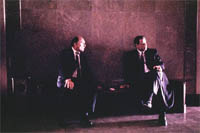
Filmmaking | How to Be a... | How To's
Fishing for Talent: How to Be a… Casting Director
Written by Kristen Paulson | Posted by: Anonymous
A casting director (CD) casts a practiced eye over a pool of prospective actors to find the right one for a job, whether a feature film, commercial or corporate video. Carolyn Pickman, C.S.A* of Collinge/Pickman Casting, Inc. (C.P. Casting) is one such fisher-of-men. C.P. Casting, a 3-person studio, has feature film credits that include "A Civil Action" and "Mystic Pizza" (one of my favorites), among others. I’d need a few more pages to list their television, commercial and corporate video credits.
The day I spoke with Carolyn, she had been "Putting out casting fires," which sound a lot more interesting than regular ones. In fact, a casting director gets hired in the pre-production phase of a project as his or her own department head. Their sole responsibility is to find the project’s actors. Her goal is to find the right person for a part, accomplished by setting up auditions, which would probably include the director, the producer and sometimes the client, if it’s a commercial.
Often clients (film directors, for example) are looking for people with "special skills." One wanted a male rower. Poor Carolyn had to troll the entire Charles looking for a handsome, muscular rower. Tough job. Other projects prove more challenging like finding people who speak Serbo-Croatian. To complete an assignment for an immigration museum, C.P. Casting needed native speakers in many languages. Italian and Spanish speakers were cake. Locating Serbo-Croatian, Romanian and Czech speakers however, required many trips to language schools and embassies. Part of being a casting director is doing this legwork, for which Carolyn enlists two additional people for finding, say, Asian-American skateboarders. When she works on movies, she typically brings in additional contract workers.
Much like New England actors, casting directors can’t afford to be choosy, but must diversify for success. The bulk of C.P. Casting’s work is currently evenly divided between film and corporate video. This is at least partially determined by not only the business climate, but also New England’s climate: In the winter it’s harder to shoot, so corporate clients tend to dominate.
Good news for you aspiring casting directors — the market is picking up. When she senses it slowing, Carolyn does reality checks with friends in New York and Los Angeles. The recent SAG strike definitely had an impact on the industry. According to Carolyn, "The best way to get a very big job is to plan a vacation during a slow time." For her, just when she stops her search, work appears. Sounds like there are some definite parallels to dating. Just when you give up, you run into Mr. Right in the Laundromat (when you look like hell).
Carolyn started her career "on the other side of the desk." In the early 70’s, she acted in Boston theatre, directed, and taught acting to teenagers in the public schools. At one point, she decided to be an actor in New York. Instead, she stayed in Boston, working production on films, and being a script supervisor. She even tried being a second assistant director. Says Carolyn about this experience, "You have to keep all the scenes in your head at all times, and know how to prioritize — my brain didn’t work that way." Since she had many community contacts from teaching, she fell into working as a casting director on a project, and credits her subsequent success partially to "knowing how to speak actor."
What happens during the casting process? When a CD receives a script, she brainstorms with a director over what the acting "palette" is — what types of people are needed. Then, she translates what the script and/or the director is calling for in an audition. Listening to the director and client’s creative input, she adds her own. Next, she comes up with actors to show them.
The ability to find the right person is akin to having a sixth sense. Says Carolyn, "When you know it, you know it — people exude a certain charisma, confidence and sex appeal. The next step is to set it up so they succeed." To ensure success, Carolyn makes sure actors are prepared for auditions, held at their office, putting scripts on a web page so they can practice.
She then calls the actors she thinks are right for an audition, filling them in and making sure they are available. Often this is done on very short notice, so CDs must educate themselves on the talent pool. To this end, Carolyn goes to many performances, in addition to lecturing and teaching at Boston University and Boston College. She also has a lecture series — "Getting Started in the Business of Acting" at The Studio. This ensures a steady flow of new talent, which is vital since Boston isn’t a big market like New York and Los Angeles. Her job depends on bringing fresh talent to producers and directors quickly, who don’t want to see the same people. If the pool gets stale here, they’ll go to New York and she’ll lose work. Build your network! Carolyn’s includes local theaters, agents, and "…any new thing [she] can think of as a resource to bring new talent."
So if you’re casting for a career and can do the above, you may make a great casting director. Not surprisingly, you can find out about jobs at NewEnglandFilm.com, which, bless her, Carolyn recommends to actors constantly. You can reach C.P. Casting at www.cpcasting.com.
*C.S.A. stands for Casting Society of America. To attain this designation, you need to have worked on three big movies, and be nominated by two C.S.A members. For more information go to: www.castingsociety.com/.
Related Articles: Casting Director Kevin Fennessy
Casting on a Budget
To Pay or Not to Pay: The Debate over Casting Fees










